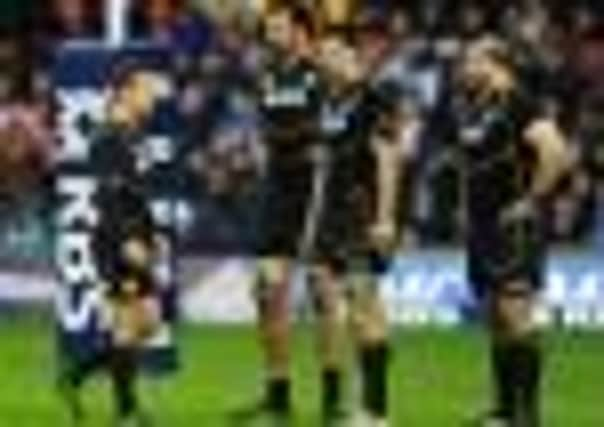Allan Massie: Joubert may have done everyone a favour


The first penalty goal in Scotland-Wales matches was kicked in 1893. From then until 1963, only another 30 penalty goals were kicked in games between the two. On Saturday there were 13 penalty goals out of 18 attempts. The 18 shots at goal represent more than half an hour of playing time, almost half the match, actually, if you add in the minutes spent fetching a kicking tee. This is crazy.
Back to Joubert: if he had set out to demonstrate that the laws relating to the set scrum and the breakdown need revision because they are so complicated that it is possible for a referee to award a penalty or free-kick every second minute of the match, he made his point. If the IRB doesn’t take note, they will be failing in their duty to the game.
Advertisement
Hide AdAdvertisement
Hide AdOnly two tries have been scored in the last 160 minutes of rugby at Murrayfield. No wonder. There’s precious little time to score tries when so much of the game is taken up with attempts at penalty goals. Two suggestions: either stop the clock as soon as the captain indicates a kick at goal, and restart it when the kicker begins his run-up, or – better? – have all penalties at goal taken by a drop-kick as in Sevens.
Back to the game, or what there was of it, which wasn’t much. It would be absurd to say that Mr Joubert cost us the match. All the same, his refereeing of the set scrum was naïve as well as pernickety. If you ping a team twice for early engagement and warn that, if it happens again, you will award a penalty against them, it’s no surprise that a streetwise front-row like the Welsh one will hold back from engaging at a scrum near their own line, confident their delaying tactic will be rewarded by a penalty.
One was left feeling dismayed. Are we going backwards rather than forward? We have scarcely threatened to score a try in the last two matches and have played no running rugby whatsoever. No point blaming the backs; they’ve hardly had the ball. Admittedly, young Duncan Weir kicked away a couple of pieces of good possession when he would have been better to pass. On the whole, however, he didn’t do badly for someone starting an international for the first time, and his chip into space, followed by a boot up field, came closer to bringing us a try than anything else till the last five minutes, when we battered vainly at the Welsh line. So he should surely start again in Paris.
The defence was good. Given the quantity and quality of possession Wales had, in the brief periods of the match when rugby was permitted, their failure to score more than one try testifies either to the strength of the Scottish defence or their own ineptitude – or perhaps both. But our defence coach Matt Taylor is evidently doing a good job.
Are our forwards too slow? Does this account for the fact that we have had so little good possession in the four matches of the championship? It seems possible. Certainly, Wales recycled the ball from the breakdown far more quickly and cleanly than we did, giving Mike Phillips a much easier time than Greig Laidlaw had. The back-row may need re-jigging, so that we have a real No 7. John Barclay is the only one available. It would be harsh to drop Rob Harley, who has made a huge number of tackles, but he would seem the one most likely to be relegated to the bench. Otherwise, it’s hard to see any changes that might usefully be made.
Jim Hamilton has been criticised for the idiotic penalty he gave away which cost us a half-time lead. Fair enough, but he wouldn’t have been in that position if the aforementioned Beattie hadn’t failed to make a straightforward catch from Dan Biggar’s restart immediately before, knocking the ball on and giving Wales a scrum. His mistake looked like a lapse of concentration, something to which Beattie has always been prone.
For years we have bemoaned the lack of firepower in the backs. Now that we have that with a dangerous back three of Stuart Hogg, Sean Maitland and Tim Visser, we seem unable to bring them effectively into the game. Scott Johnson was originally hired as an attack coach, but we aren’t doing any attacking.
So what now? Despite everything, we have recorded two wins and we go to Paris to play a French team desperate (one assumes) to avoid the Wooden Spoon. We are free of that anxiety this year and free too of the slim chance of the championship we had on Saturday. So perhaps the players should simply be told to go out and enjoy themselves.
Advertisement
Hide AdAdvertisement
Hide AdBrian Clough once went into the Nottingham Forest dressing-room with the players expecting an ear-blistering oration after a couple of defeats. He tossed a ball on to the floor and said: “There’s a ball – now go out and play with it.” Good advice which Scott Johnson might sensibly repeat.